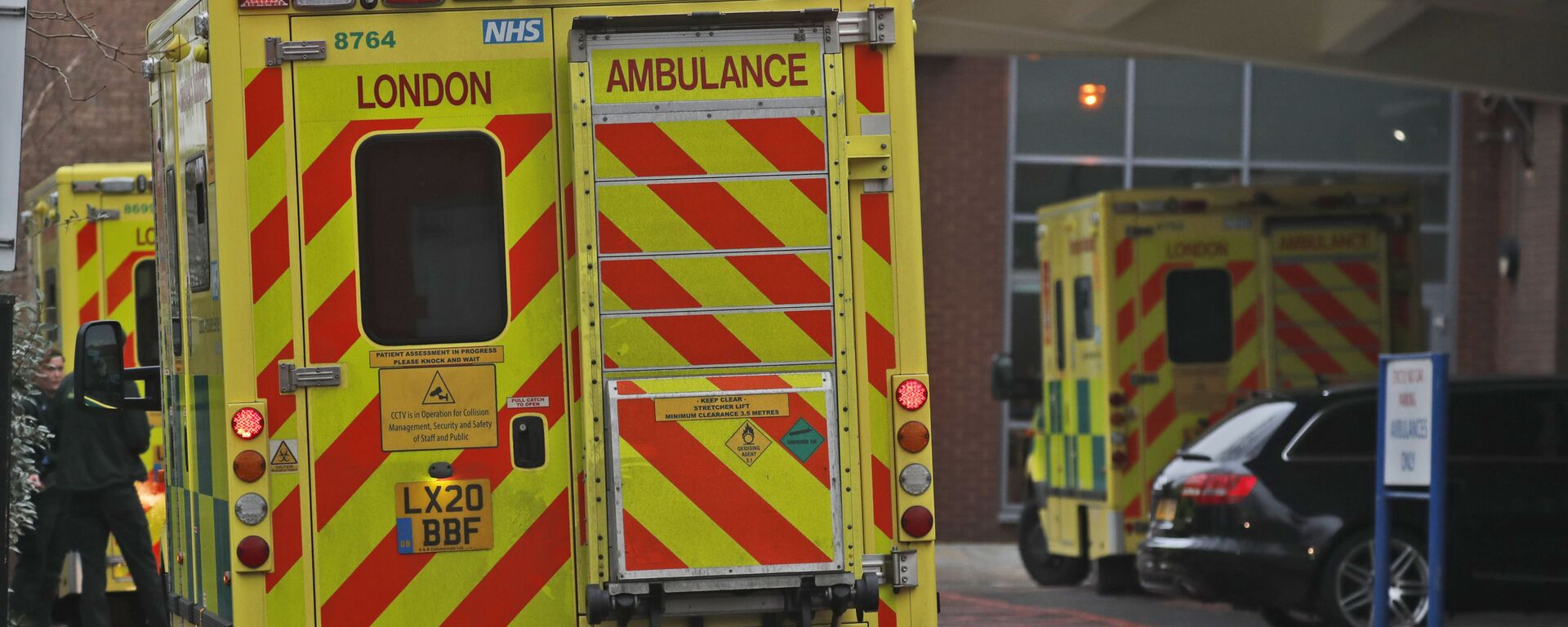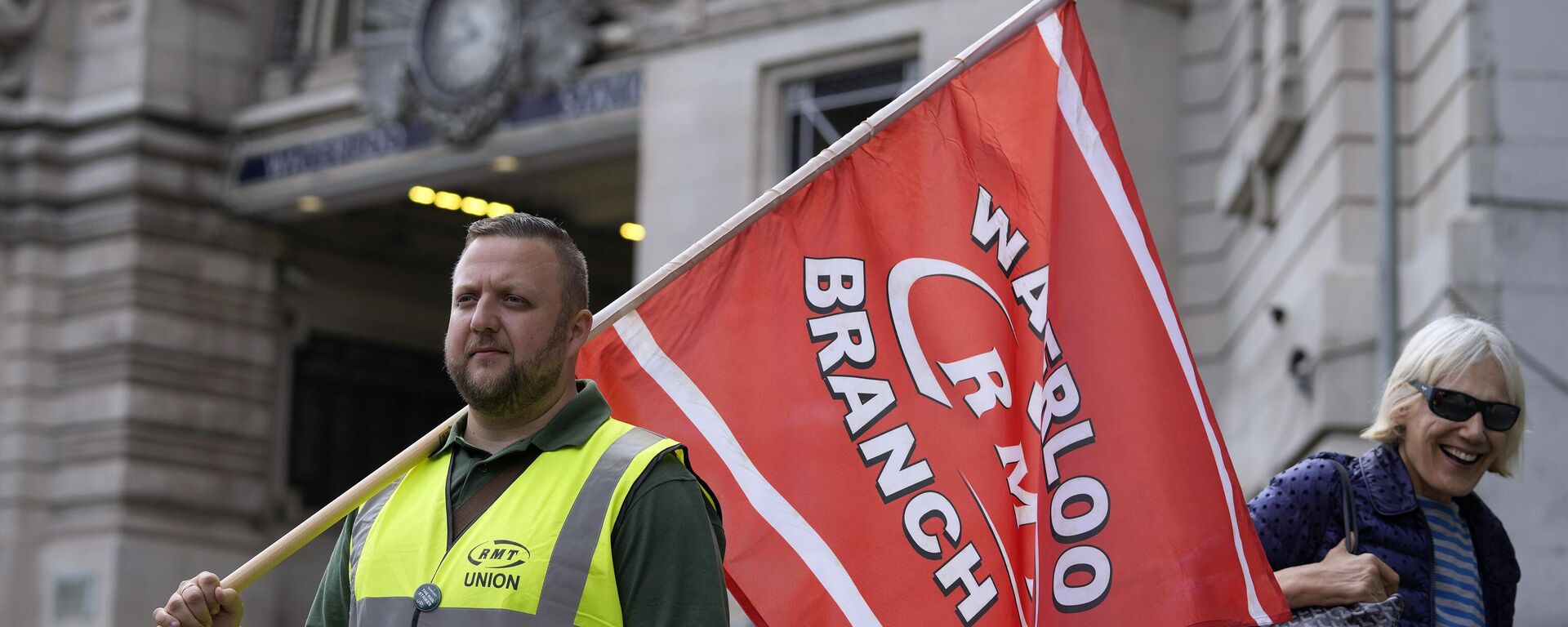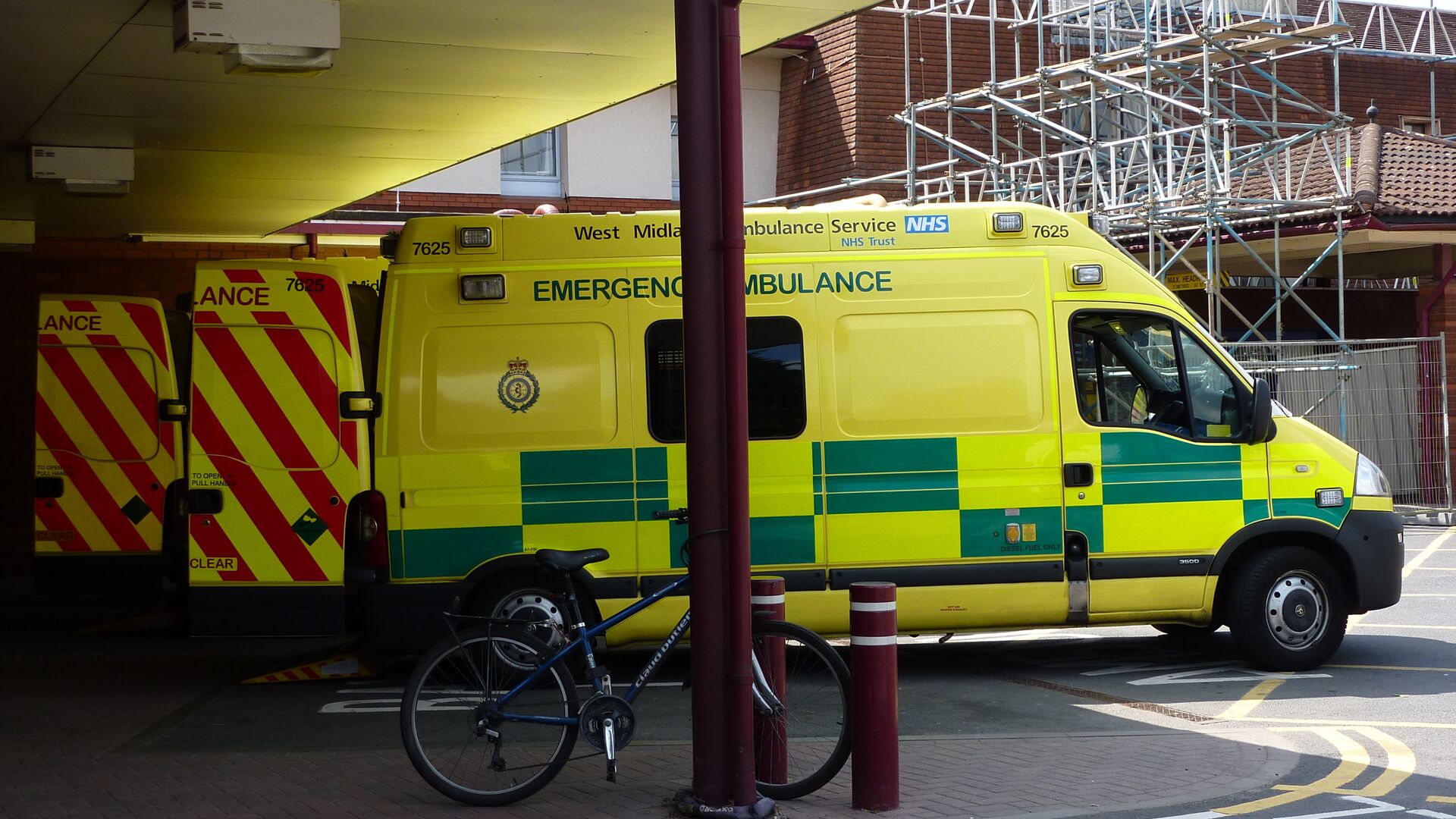https://sputnikglobe.com/20221130/first-uk-wide-ambulance-strike-in-30-years-looms-as-inflation-hits-pay-packets-1104883280.html
First UK-Wide Ambulance Strike in 30 Years Looms as Inflation Hits Pay Packets
First UK-Wide Ambulance Strike in 30 Years Looms as Inflation Hits Pay Packets
Sputnik International
The UK's National Health Service was already struggling with demand for emergency services before sanctions on Russian energy, food and fertiliser imports... 30.11.2022, Sputnik International
2022-11-30T14:29+0000
2022-11-30T14:29+0000
2023-05-28T15:25+0000
britain
great britain
ambulance
strike
gmb union
unison
national health service (nhs)
world
united kingdom (uk)
https://cdn1.img.sputnikglobe.com/img/101801/96/1018019601_0:342:3648:2394_1920x0_80_0_0_5c50be9254faf49b9d7ecbcf2e62f307.jpg
Ambulance staff across the UK have voted to strike in the latest dispute over pay offers that fall way below inflation.Health and municipal union Unison announced on Tuesday that some 80,000 of its members had voted to strike after rejecting a four per cent pay offer from the National Health Service (NHS).The Consumer Price Index (CPI) rate of inflation is currently running at 11.1 per cent, thanks to energy shortages caused by sanctions imposed on Russia over its special military operation in Ukraine.However, in many areas the ballot fell short of the legal threshold of 50 per cent of paid-up members backing industrial action in their districts. Strikes will go ahead in London, the South West, the North East, North West and Yorkshire.The GMB union, the largest union organising ambulance workers, has already voted to walk out in what would be the first nationwide strike in the emergency service for 30 years — amid an ongoing crisis in emergency care.But she stressed that her members knew ambulance delays and lengthy waiting times for accident and emergency care will not fall "until the Government acts on wages."Some 100,000 members of the Royal College of Nursing (RCN) will also walk out in its first-ever nationwide strike. The union announced on Tuesday that 52 hospitals and other sites in England would be affected in the first round, along with all NHS providers in Northern Ireland and all but one in Wales.Health Service in CrisisThe NHS is suffering a widespread crisis in its accident and emergency (A&E) departments, with ambulances often queuing to unload patients. Ambulance service chiefs have said that has led to patients dying or suffering harm on a daily basis.Walk-in cases often wait 12 hours to see a doctor and days to be transferred to a ward. At the new Queen Elizabeth University Hospital in Glasgow, only 35 per cent of A&E patients are seen within four hours. Last week the nearby Royal Hospital for Children appealed to parents not to bring their children to its A&E department unless in emergency or life-threatening situations.Hospital outpatient departments are also struggling to catch up with a huge backlog of non-urgent cases in the wake of the COVID-19 lockdown, when tens of thousands of operations were cancelled to free up beds for patients with the virus, while the burden of elderly care has increased.The root causes of the problem date back decades, with many smaller facilities closed under successive governments in favour of new super-hospitals.But demand for emergency services has also increased, with the annual number of A&E attendances rising from 21.5 million to 25 million in the eight years from 2012 to 2020 according to charity the King's Fund.General Practitioners (GPs) — the local family doctors who contract services to the NHS — also refused to see non-urgent cases during the pandemic. Patients were shunted along to the 111 non-emergency health line and ultimately to hospital emergency departments, exacerbating the problem of the millions who are not registered with a GP arriving at A&E.A shortage of dentists means many can no longer access NHS-subsidised care — or even find a surgery that will take on new private patients. That has led to the Toothless in England campaign demanding more government funding and universal dental treatment on the NHS.
https://sputnikglobe.com/20220901/nhs-chiefs-fear-energy-crisis-could-see-hospital-services-cut-back-1100259919.html
https://sputnikglobe.com/20221125/new-winter-of-discontent-strike-wave-threatens-uk-christmas-festivities-1104695434.html
britain
great britain
united kingdom (uk)
Sputnik International
feedback@sputniknews.com
+74956456601
MIA „Rossiya Segodnya“
2022
James Tweedie
https://cdn1.img.sputnikglobe.com/img/07e4/08/1c/1080307270_0:3:397:400_100x100_80_0_0_7777393b9b18802f2e3c5eaa9cbcc612.png
James Tweedie
https://cdn1.img.sputnikglobe.com/img/07e4/08/1c/1080307270_0:3:397:400_100x100_80_0_0_7777393b9b18802f2e3c5eaa9cbcc612.png
News
en_EN
Sputnik International
feedback@sputniknews.com
+74956456601
MIA „Rossiya Segodnya“
Sputnik International
feedback@sputniknews.com
+74956456601
MIA „Rossiya Segodnya“
James Tweedie
https://cdn1.img.sputnikglobe.com/img/07e4/08/1c/1080307270_0:3:397:400_100x100_80_0_0_7777393b9b18802f2e3c5eaa9cbcc612.png
uk, nhs, national health service, ambulance, strike, unison, uk ambulance strike
uk, nhs, national health service, ambulance, strike, unison, uk ambulance strike
First UK-Wide Ambulance Strike in 30 Years Looms as Inflation Hits Pay Packets
14:29 GMT 30.11.2022 (Updated: 15:25 GMT 28.05.2023) The UK's National Health Service was already struggling with demand for emergency services before sanctions on Russian energy, food and fertiliser imports provoked the cost-of-living crisis. Now strikes are breaking out in multiple sectors over below-inflation pay offers.
Ambulance staff across the UK have voted to strike in the latest dispute over pay offers that fall way below
inflation.
Health and municipal union Unison announced on Tuesday that some 80,000 of its members had voted to strike after rejecting a four per cent pay offer from the National Health Service (NHS).
The Consumer Price Index (CPI) rate of inflation is currently running at 11.1 per cent, thanks to energy shortages caused by sanctions imposed on Russia over its special military operation in Ukraine.
However, in many areas the ballot fell short of the legal threshold of 50 per cent of paid-up members backing industrial action in their districts. Strikes will go ahead in London, the South West, the North East, North West and Yorkshire.
The GMB union, the largest union organising ambulance workers, has already voted to walk out in what would be the first nationwide strike in the emergency service for 30 years — amid an ongoing crisis in emergency care.
"The decision to take action and lose a day’s pay is always a tough call," Unison general secretary Christina McAnea said. "It’s especially challenging for those whose jobs involve caring and saving lives."
But she stressed that her members knew ambulance delays and lengthy waiting times for accident and emergency care will not fall "until the Government acts on wages."
Some 100,000 members of the
Royal College of Nursing (RCN) will also walk out in its first-ever nationwide strike. The union announced on Tuesday that 52 hospitals and other sites in England would be affected in the first round, along with all NHS providers in Northern Ireland and all but one in Wales.

1 September 2022, 12:58 GMT
The NHS is suffering a widespread crisis in its accident and emergency (A&E) departments, with ambulances often queuing to unload patients. Ambulance service chiefs have said that has led to patients dying or
suffering harm on a daily basis.
Walk-in cases often wait 12 hours to see a doctor and days to be transferred to a ward. At the new Queen Elizabeth University Hospital in Glasgow, only 35 per cent of A&E patients are seen within four hours. Last week the nearby Royal Hospital for Children appealed to parents not to bring their children to its A&E department unless in emergency or life-threatening situations.
Hospital outpatient departments are also struggling to catch up with a huge backlog of non-urgent cases in the wake of the COVID-19 lockdown, when tens of thousands of operations were cancelled to free up beds for patients with the virus, while the burden of elderly care has increased.

25 November 2022, 16:08 GMT
The root causes of the problem date back decades, with many smaller facilities closed under successive governments in favour of new super-hospitals.
But demand for emergency services has also increased, with the annual number of A&E attendances rising from 21.5 million to 25 million in the eight years from 2012 to 2020 according to charity the
King's Fund.
General Practitioners (GPs) — the local family doctors who contract services to the NHS — also refused to see non-urgent cases during the pandemic. Patients were shunted along to the 111 non-emergency health line and ultimately to hospital emergency departments, exacerbating the problem of the millions who are not registered with a GP arriving at A&E.
A shortage of dentists means many can no longer access NHS-subsidised care — or even find a surgery that will take on new private patients. That has led to the
Toothless in England campaign demanding more government funding and universal dental treatment on the NHS.





